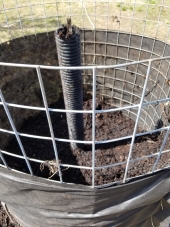

 4
4




a new permaculture fledgling that needs to learn lots
 4
4




Anna Messerschmidt wrote:Good Morning Kate,
I am hoping you may have a suggestion for me. I struggle with vast supply of manure that I am trying to compost. My current approach is to put it all in a giant pile and wait and hope it will turn out. That works somewhat, but it takes a long time and the piles are becoming numerous. Do you have a suggestion how I could speed up the process? I do have a tractor with front-end loader available, but mostly work with a pitchfork by hand.
The Compost Coach is a colourful, comprehensive and accessible guide to creating the very best compost AKA garden gold. Check out my book here: https://geni.us/TheCompostCoach & my IG here: https://www.instagram.com/compostable.kate/
 5
5




 3
3




Glenn Raleigh wrote:We have 2 Guernsey cows who dispose of many pounds of manure a day. In the winter when they live in or near the barn we collect a wheelbarrow full each day. We roll it or sled it out into a collecting area about 50 foot diameter circle. This i the first year of massive collection.
Over the summer we have added straw, leaves etc to the area and let the chickens do as they do with it, Now in the early fall it is dried out and easy to shovel etc.
Dairy cow manure is really wet when first collected.
What to do now for preparation for the Spring so we can use it and also make its footprint smaller so we can start anew
The Compost Coach is a colourful, comprehensive and accessible guide to creating the very best compost AKA garden gold. Check out my book here: https://geni.us/TheCompostCoach & my IG here: https://www.instagram.com/compostable.kate/

 3
3




My suggestions for you - ageing your manure in piles is a great idea, but you won't produce "compost" doing this - it will simply be mature manure which can be used on your garden after about one year. To turn it into compost and speed up the decomposition add an equal volume of carbon-rich materials (shredded autumn leaves, aged wood chips, ripped paper or cardboard etc) and keep the pile moist as compost microbes need access to water to thrive and multiply.
- Tim's Homestead Journal - Purchase a copy of Building a Better World in Your Backyard - Purchase 6 Decks of Permaculture Cards -
- Purchase 12x Decks of Permaculture Cards - Purchase a copy of the SKIP Book - Purchase 12x copies of Building a Better World in your Backyard
 1
1




 2
2




 2
2








